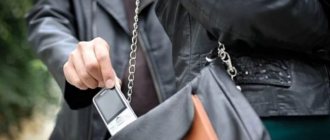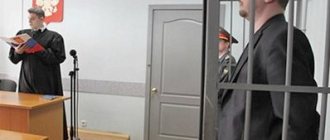One of the most frequently encountered in judicial practice is the charge of fraud. Modern swindlers come up with new fraudulent schemes with enviable regularity. It is quite difficult to prove and qualify this type of illegal acts, and sometimes law enforcement officers interpret some actions that do not violate the law as fraud, undeservedly initiating criminal proceedings.
The most correct decision of a citizen who is wrongfully accused of fraud would be to contact a professional lawyer who is able to understand the situation and legally competently protect the interests of the client.
Qualification of fraud in the Criminal Code of Russia
In accordance with the meaning of Article 159 of the Code of Criminal Procedure of Russia, a criminal act qualified as fraud is understood as the actions of a criminal, the purpose of which is the appropriation of property values that are the property of another citizen. It is committed by misleading him or by violating his trust.
In other words, the owner of property values either voluntarily gives them up in favor of the fraudster, or does not resist him when he takes away the values in any way.
When a citizen is unfairly accused of fraud, the first thing he will have to prove is the absence of malicious intent in his actions in the form of deception or a desire to take advantage of the victim’s trust. If the indicated signs of a criminal act are absent, then it cannot be classified as fraud, but there may be elements of another crime.
How to get help from a lawyer for free?
All the same art. 48 of the Constitution of the Russian Federation indicates that in cases provided for by law, legal assistance is provided free of charge. What specific cases are we talking about? Let's figure it out.
In accordance with the provisions of Art. 26 of the Federal Law “On advocacy and advocacy in the Russian Federation”, only persons whose income is below the subsistence level established in the region of residence can count on receiving free assistance.
If you meet this requirement and want to receive free legal assistance, you need to contact the bar association in your city. Don't forget to prepare the following package of documents:
- Passport of a citizen of the Russian Federation;
- Certificate of income for 3 months;
- A written application for the provision of free legal assistance.
Note! If you are denied access to a government lawyer, you can turn to the site’s lawyers for help - this is a simple and reliable way to get qualified help in the shortest possible time.
Types of liability for fraud
For a criminal act qualified as fraud, depending on its severity, in accordance with Article 149 of the Code of Criminal Procedure of the Russian Federation and the resolution adopted by the Plenum on fraud, embezzlement and embezzlement, they may be imposed in the form of a fine, correctional labor or forced isolation of the offender in prison .
If the amount of damage caused to the victim by the fraudster is qualified by a court decision as minor, then a fine may be collected from him, the amount of which is determined by the court.
In cases where fraud is classified by the court:
- under Part 1 of Article 149, a fraudster may be punished by isolation from society for up to two years;
- according to Part 2 of this article – no more than 5 years;
- according to part 3 p. 149 the prison term can reach 6 years.
Under Part 4, punishment is imposed for fraud on an especially large scale (1 million rubles or more), or committed by a group of persons by prior conspiracy. In this case, there may be punishment in the form of isolation from society for up to 10 years and the simultaneous imposition of a fine in the amount of 1 million rubles, as well as additional restriction of freedom for up to 2 years.
When making a court decision, the personality characteristics of the accused, the presence of mitigating and aggravating circumstances, the degree of cooperation with the investigation and the court, etc. are taken into account.
Fraud – qualification of a criminal act and main features
The essence of fraudulent actions is that one citizen tries to take possession of the property and financial assets of another citizen by deception or by abusing trust. All actions take place without coercion. The victim transfers money or material assets to another person voluntarily.
In fact, no legislative violations occur, but later, during the investigation of the case, facts are revealed indicating that the guilty person provoked another person to voluntarily transfer the property, that is, the deception was intentional. In this case, the sanctions mentioned in Art. will be applied to the guilty citizen. 159 of the Criminal Code of the Russian Federation, which includes imprisonment.
What to do if you are accused of fraud
If you are accused of fraudulent activities, then according to the legal norms of the current legislation, you can and should do the following.
- If criminal proceedings have not yet been initiated, you should immediately contact a professional lawyer who has the appropriate qualifications and the necessary experience. As legal practice shows, in most such cases the problem can be resolved at the stage of verification activities carried out by law enforcement officers.
- Compensate the victim of the fraudulent activity if you actually committed it. As a rule, verification activities by law enforcement officers take from 10 to 30 working days. During this period, it is possible, by compensating the victim for damages, to convince him to drop the charges.
- Prove that the accusation is not substantiated and is not supported by anything other than the words of the imaginary victim. You can also warn the person accusing you of liability (up to criminal liability) for libel, since according to Article 306 of the Code of Criminal Procedure of Russia, criminal punishment is provided for false denunciation.
- Actively cooperate with law enforcement agencies at the stage of verification activities, giving specific and complete testimony on the issues raised. Such cooperation may become a justification for refusing to initiate investigative actions in this case. The services of a fraud lawyer may be a deciding factor in this decision.
Carrying out these actions at the stage before the investigative check is necessary, since it is at this stage that the decision is made to initiate criminal proceedings.
Defense strategy
If they try to accuse a citizen of fraud , but no concrete evidence has been presented, there is no need to worry. On the contrary, after a “refusal” decision is issued, there is a chance to punish the applicant under Art. 306 of the Criminal Code of the Russian Federation False denunciation. However, if there are sufficient facts indicating a person’s involvement in the commission of a crime, the investigator will initiate a case under Art. 159 of the Criminal Code. And that's usually what happens!
If you are accused of fraud that you did not commit, you should not shy away from talking with the investigator, hoping that everything will be proven without your participation.
The first thing you need to do is hire a good lawyer who will help you build the right defense strategy and protect you from unnecessary pressure from law enforcement agencies.
Pre-trial protection
Pre-trial protection is carried out at the stage of pre-investigation, preliminary investigation, and also after the presentation of charges (before transferring the case to court). If a person is accused of fraud , the fight should begin immediately after receiving the investigator's order to check the materials received from the applicant.
At the first stage, all the facts indicated by the victim in the statement, the testimony of witnesses are checked, and the person who allegedly committed the crime may also be interviewed. If the accused is able to prove his innocence under the article or agrees with the victim on compensation for damage, the investigation will issue a decision to refuse to initiate a criminal case. However, if signs of a crime are identified, a case will be opened, and the second stage will begin - the preliminary investigation.
At the second stage, the citizen is assigned the status of a suspect; he may be required not to leave his place of residence until the end of the investigative measures. The law does not place the obligation on a citizen to prove his innocence ; however, he must facilitate the investigation.
So, what to do if you are accused of fraud:
- it is necessary to give evidence refuting the presence of intent to commit a crime. But remember that any conflicting information will be checked and may be used against the suspect;
- it is necessary to participate in investigative actions, including confrontations with witnesses and the victim. As a rule, they are aimed at eliminating contradictions in testimony and establishing factual circumstances;
IMPORTANT! Sometimes confrontations make it possible to establish the innocence of a citizen, since those warned of criminal liability under Art. 307 of the Criminal Code of the Russian Federation, witnesses and the victim refuse previously given testimony.
- it is necessary to present documents, correspondence, photographic materials that testify to the innocence of the suspect.
You can use another method - go to court and appeal the investigator’s decision under Art. 125 Code of Criminal Procedure. Such cases are considered quickly (no more than 10 days from the date of filing the application), and the result may be the termination of criminal prosecution.
ATTENTION! You must file a complaint with the court no later than 10 days from the date of receipt of the decision to recognize you as a suspect in a criminal case. After this period, the application may be refused.
If the investigation establishes the presence of criminal motives, the citizen is transferred to the status of an accused. At this stage, it is almost impossible to close the case, and protecting interests is reduced to challenging the conclusions of the investigation, witness testimony and requests for additional measures.
Is a person obliged to prove his innocence at the investigation stage? Do I need to include all the evidence of my non-involvement or will the investigator do this for the accused?
Under no circumstances rely on the investigator. Only an experienced lawyer will make every effort to defeat the arguments set out in the indictment, because it will be much more difficult to defend yourself in court. In addition, the defense may be denied consideration of additional arguments if they have not been examined earlier in the case.
Defense in Court
After the investigation is completed and the parties have familiarized themselves with the materials, the case is transferred to the court of first instance. After the documents are accepted by the secretariat, a hearing date is set, of which all parties are notified by SMS (if consent is available) or in writing. If the court clerk informs the defendant of the date by telephone, she must make a corresponding note in a special journal.
ATTENTION! Consideration of the case in the absence of the accused or his lawyer is grounds for overturning the sentence.
Let's figure out how to prove your innocence in court. In addition to the accused and his lawyer, the process involves the victim, as well as the prosecutor. The defense and prosecution have the right to file a motion, call witnesses, present documents, as well as examination results, and ask the judge to read out the case materials.
At this stage, the right to prove innocence rests entirely with the defendant’s lawyer; the defense strategy he chooses will determine whether his client will be punished.
After questioning all the defendants in the case, the parties are given the final word. During the debate, you can voice your position on the case, for example, declare innocence, desire to compensate for the damage caused, the presence of mitigating circumstances, etc. The judge will then retire to the deliberation room to make a decision.
ATTENTION! As a rule, within 10 days, court decisions are prepared and issued to all parties involved in the process.
Appeal against the verdict
If the court decides to find the defendant guilty, he can file an appeal. She is sent to a higher authority within 10 days from the date of receipt of the verdict. An appeal against a court decision is possible if an excessively severe punishment is imposed, there is a discrepancy between the factual circumstances of the case and the conclusions of the court of first instance, violation of the rules of the Code of Criminal Procedure, errors in the indictment, failure to fulfill a pre-trial agreement and the absence of a receipt explaining the rights of the accused.
ATTENTION! If you miss the deadline, the appeal will be left without consideration.
After the documents are accepted, all parties are given time to submit their objections, and then the hearing begins. Depending on the arguments, the court can consider only the complaint or the entire case, and as a result make an acquittal, but usually, if there are gross violations, the higher authority decides to send the case to a lower court for retrial. But this is rare. Usually a decision is made to leave everything unchanged.
At this stage, the convicted person is considered guilty until proven innocent on appeal. Therefore, the execution of the court decision begins immediately after the decision is announced. If the offender is sentenced to restriction of freedom, he is obliged to appear before the FSIN inspector and register if the convicted person received a suspended sentence. If these requirements are not met, the punishment may be revised from conditional to real.
The easiest way is to terminate a criminal case at the pre-investigation stage; it is much more difficult to achieve an acquittal in court.
Conclusion
When an accusation of fraud is brought against you, you should not panic, but try to understand the nature and weight of the claims made. If the accusation is false and there is no significant evidence, the slanderer should be warned about criminal liability for actions that go beyond the law.
Otherwise, at the preliminary inspection stage, it is necessary to compensate for the damage caused and convince the victim to renounce the accusation.
The assistance of a professional lawyer in both cases will be decisive in achieving a favorable resolution to the controversial issue. A qualified lawyer will understand the current situation and effectively protect the interests of the client at all stages of pre-trial investigative measures and during the trial, if it comes to it.
Fraud or civil dispute?
The investigation is, of course, capable of clearly distinguishing between deception and civil law relations, but the police have no particular desire to do this either at the stage of investigation or at the court at the stage of trial. Especially if the person accused of fraud by deception does not particularly insist on his innocence. The court simply takes the received criminal case and its evidence base for granted and does not take into account the weak attempts of resistance on the part of the defendant. And if he was convinced of a special procedure, then the matter goes off with a bang.
Despite the provisions of the Constitution and the presumption of innocence, all concerns about collecting evidence of innocence one way or another fall on the defense and the defendant’s lawyer . Due to, as noted above, the accusatory bias of the judicial system, assigning the responsibility of proving the guilt of the accused to the prosecution plays a cruel joke on citizens: they do not seem to be obliged to confirm their innocence, but are a priori guilty from the moment the case comes to court.
How to prove fraud under the law?
The most difficult thing that victims of fraudulent actions usually face is the need to prove the fact of theft. According to Art. 74 of the Code of Criminal Procedure of the Russian Federation, the following can be considered evidence of the fraudster’s guilt:
- A sincere confession of committing a criminal offense is extremely rare, but it serves as the most accurate evidence of the guilt of the suspect (accused).
- Witness testimony - suitable in cases where the theft affected not one, but several victims (for example, pensioners of the same house from “fictitious” insurers).
- Expertise results - sometimes in order to prove the fact of selfish acts it is necessary to involve an expert.
- Material evidence – first of all, the stolen property of the victims, as well as the means with which the fraudster committed secret thefts (computer, ATM scanner, smartphone, fake receipts, etc.).
Having figured out how to prove fraudulent intentions, all that remains is to contact law enforcement agencies or the court.
Author of the article
Dmitry Leonov
Work experience 15 years, specialization - housing, family, inheritance, land, criminal cases.
Author's rating
721
Articles written
712
about the author
Useful information on fraud
- Bank fraud
- Deception of evidence in civil proceedings
- Falsification of evidence in arbitration proceedings
- Falsification of evidence
- Fraudsters with bank cards
- How to prove fraud
- Loan Fraud
- Fraud in the sale of land
- Sample application for falsification of evidence
- Forged documents - Criminal Code of the Russian Federation
- Petty fraud
- Forgery of signature
- Fraud in financial markets
- Fraud on a grand scale
- Criminal liability for fraud
- Apartment fraud
- Car fraud
- Phone scam
- Insurance Fraud
- Responsibility for forgery of documents
- Fraud charge
- Help for defrauded investors
- Fraud of consumers in the Criminal Code of the Russian Federation
- Fraud when applying for a loan
- Fraud Claim
- Scammers on the Internet
- Fraud in the sale of real estate
- Deal under the influence of deception
- Forgery of driver's license
- Statute of limitations for fraud cases
- Aiding fraud - article of the Criminal Code of the Russian Federation
- Maternity capital fraud
- Attempted fraud
- Forgery of sick leave
- What to do if you were deceived in an online store
How to recognize fraud?
Fraud is considered to be illegal actions against individuals and legal entities. A key indicator of the fact of theft is a selfish goal - to take possession of someone else's property or the right to this property for future transactions.
Fraudulent actions are expressed in two directions (which must be proven):
- Deception • provision of knowingly false data for further selfish intentions; • concealment of important terms of the transaction; • substitution of information or the original with fictitious things (documents); • misleading the victim in order to seize his property or rights to this property.
- Abuse of trust • making a transaction based on trust between people (family or official ties, partnerships, friendship, etc.); • invalidity of the drawn up agreement (for example, in terms of protection of the parties from the influence of third parties); • financial or other capabilities of the fraudster, which do not give reason to consider him a selfish participant in the transaction; • willingness to fulfill their obligations (for example, after making an advance payment or the full amount of the service).







